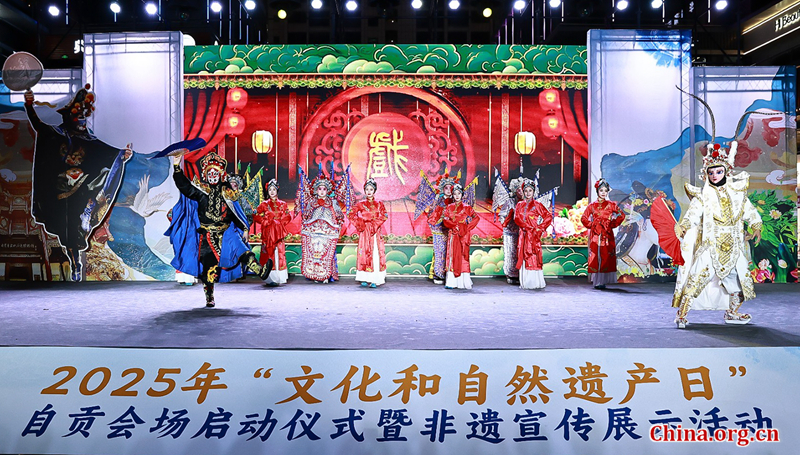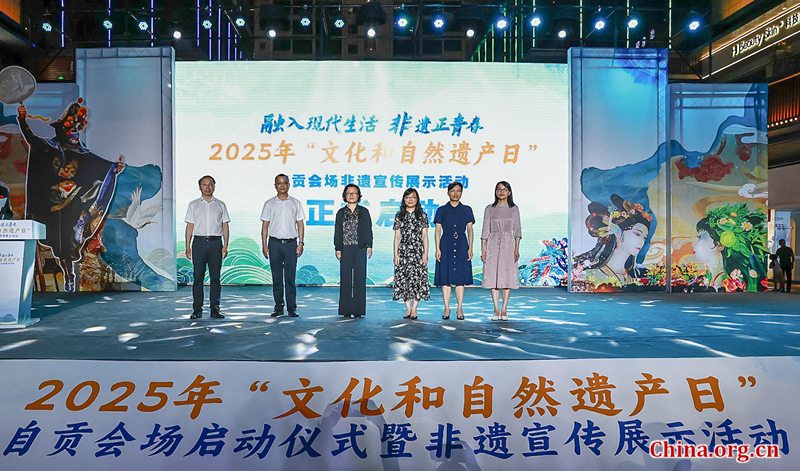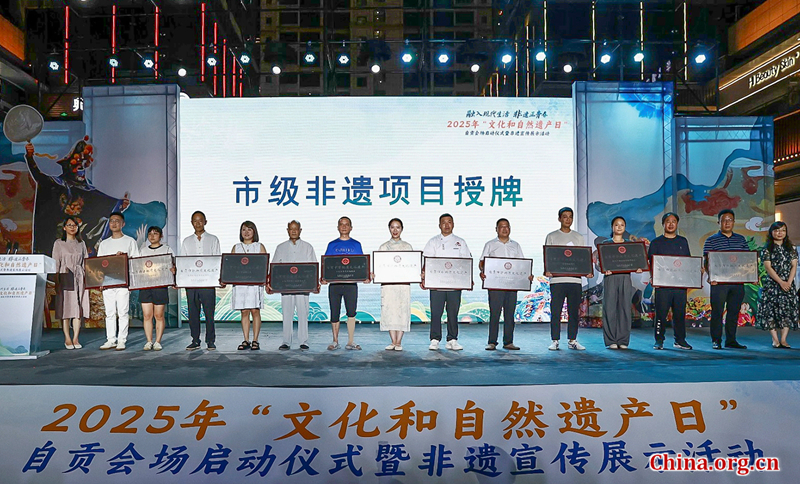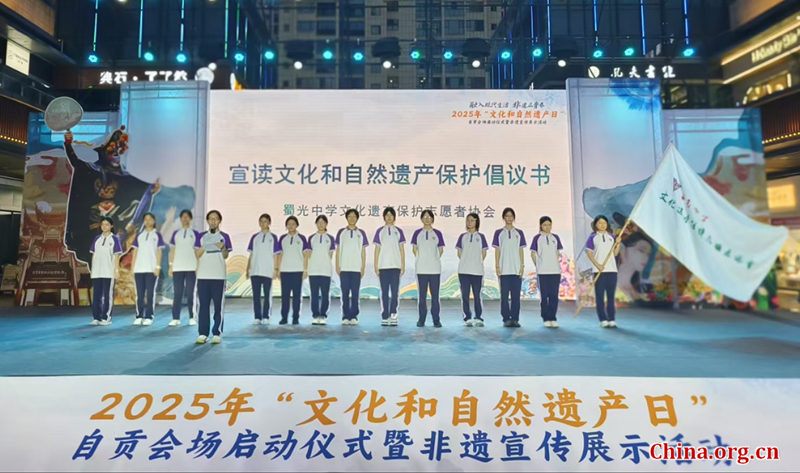
The Zigong venue for the 2025 Cultural and Natural Heritage Day opened on June 20, featuring a showcase and activities celebrating China's intangible cultural heritage.
Cultural and Natural Heritage Day, established in 2006, is observed annually on the second Saturday of June to raise awareness of China's efforts to preserve its cultural and natural heritage.
This year's event in Zigong highlighted efforts to support young inheritors, blend intangible cultural heritage with modern lifestyles and use technology to preserve traditions. Through live performances, markets and interactive workshops, organizers aim to transform Zigong's heritage into a catalyst for cultural tourism and consumer spending.
At the launch ceremony, representatives from the Shuguang High School Cultural Heritage Volunteer Association read the Proposal on the Protection of Cultural and Natural Heritage. A youth-oriented cultural heritage tour, titled "Exploring the Salt Capital: A Youthful Intangible Cultural Heritage Journey," was also launched to spark interest among young visitors.
The venue buzzed with activity across 39 themed zones, including heritage workshops, food and culture markets, creative product booths, and learning spaces. Visitors enjoyed hands-on experiences, shopped for creative heritage products, and sampled services such as traditional Chinese medicine consultations.
In addition to the main venue activities, a series of citywide events held this month is bringing heritage closer to the public. Highlights include calligraphy and painting exhibitions, children's art showcases featuring cultural and creative works, campus and rural outreach programs, grassroots tie-dye workshops, and cultural tourism promotions in Fushun county. Other attractions include clay pottery demonstrations, the Aiye Ancient Town Culture and Tourism Event, and the Yantan District Shopping Festival.
Zigong is home to 243 officially recognized intangible cultural heritage items, including four at the national level: the lantern festival, tie-dye techniques, Gong fan craftsmanship and deep well salt-drilling and extraction techniques. The city also has 172 registered inheritors of these traditions, with 26 recognized at the national or provincial level.

The Zigong venue for the 2025 Cultural and Natural Heritage Day opened on June 20, featuring a showcase and activities celebrating China's intangible cultural heritage.
Cultural and Natural Heritage Day, established in 2006, is observed annually on the second Saturday of June to raise awareness of China's efforts to preserve its cultural and natural heritage.
This year's event in Zigong highlighted efforts to support young inheritors, blend intangible cultural heritage with modern lifestyles and use technology to preserve traditions. Through live performances, markets and interactive workshops, organizers aim to transform Zigong's heritage into a catalyst for cultural tourism and consumer spending.
At the launch ceremony, representatives from the Shuguang High School Cultural Heritage Volunteer Association read the Proposal on the Protection of Cultural and Natural Heritage. A youth-oriented cultural heritage tour, titled "Exploring the Salt Capital: A Youthful Intangible Cultural Heritage Journey," was also launched to spark interest among young visitors.
The venue buzzed with activity across 39 themed zones, including heritage workshops, food and culture markets, creative product booths, and learning spaces. Visitors enjoyed hands-on experiences, shopped for creative heritage products, and sampled services such as traditional Chinese medicine consultations.
In addition to the main venue activities, a series of citywide events held this month is bringing heritage closer to the public. Highlights include calligraphy and painting exhibitions, children's art showcases featuring cultural and creative works, campus and rural outreach programs, grassroots tie-dye workshops, and cultural tourism promotions in Fushun county. Other attractions include clay pottery demonstrations, the Aiye Ancient Town Culture and Tourism Event, and the Yantan District Shopping Festival.
Zigong is home to 243 officially recognized intangible cultural heritage items, including four at the national level: the lantern festival, tie-dye techniques, Gong fan craftsmanship and deep well salt-drilling and extraction techniques. The city also has 172 registered inheritors of these traditions, with 26 recognized at the national or provincial level.

The Zigong venue for the 2025 Cultural and Natural Heritage Day opened on June 20, featuring a showcase and activities celebrating China's intangible cultural heritage.
Cultural and Natural Heritage Day, established in 2006, is observed annually on the second Saturday of June to raise awareness of China's efforts to preserve its cultural and natural heritage.
This year's event in Zigong highlighted efforts to support young inheritors, blend intangible cultural heritage with modern lifestyles and use technology to preserve traditions. Through live performances, markets and interactive workshops, organizers aim to transform Zigong's heritage into a catalyst for cultural tourism and consumer spending.
At the launch ceremony, representatives from the Shuguang High School Cultural Heritage Volunteer Association read the Proposal on the Protection of Cultural and Natural Heritage. A youth-oriented cultural heritage tour, titled "Exploring the Salt Capital: A Youthful Intangible Cultural Heritage Journey," was also launched to spark interest among young visitors.
The venue buzzed with activity across 39 themed zones, including heritage workshops, food and culture markets, creative product booths, and learning spaces. Visitors enjoyed hands-on experiences, shopped for creative heritage products, and sampled services such as traditional Chinese medicine consultations.
In addition to the main venue activities, a series of citywide events held this month is bringing heritage closer to the public. Highlights include calligraphy and painting exhibitions, children's art showcases featuring cultural and creative works, campus and rural outreach programs, grassroots tie-dye workshops, and cultural tourism promotions in Fushun county. Other attractions include clay pottery demonstrations, the Aiye Ancient Town Culture and Tourism Event, and the Yantan District Shopping Festival.
Zigong is home to 243 officially recognized intangible cultural heritage items, including four at the national level: the lantern festival, tie-dye techniques, Gong fan craftsmanship and deep well salt-drilling and extraction techniques. The city also has 172 registered inheritors of these traditions, with 26 recognized at the national or provincial level.

The Zigong venue for the 2025 Cultural and Natural Heritage Day opened on June 20, featuring a showcase and activities celebrating China's intangible cultural heritage.
Cultural and Natural Heritage Day, established in 2006, is observed annually on the second Saturday of June to raise awareness of China's efforts to preserve its cultural and natural heritage.
This year's event in Zigong highlighted efforts to support young inheritors, blend intangible cultural heritage with modern lifestyles and use technology to preserve traditions. Through live performances, markets and interactive workshops, organizers aim to transform Zigong's heritage into a catalyst for cultural tourism and consumer spending.
At the launch ceremony, representatives from the Shuguang High School Cultural Heritage Volunteer Association read the Proposal on the Protection of Cultural and Natural Heritage. A youth-oriented cultural heritage tour, titled "Exploring the Salt Capital: A Youthful Intangible Cultural Heritage Journey," was also launched to spark interest among young visitors.
The venue buzzed with activity across 39 themed zones, including heritage workshops, food and culture markets, creative product booths, and learning spaces. Visitors enjoyed hands-on experiences, shopped for creative heritage products, and sampled services such as traditional Chinese medicine consultations.
In addition to the main venue activities, a series of citywide events held this month is bringing heritage closer to the public. Highlights include calligraphy and painting exhibitions, children's art showcases featuring cultural and creative works, campus and rural outreach programs, grassroots tie-dye workshops, and cultural tourism promotions in Fushun county. Other attractions include clay pottery demonstrations, the Aiye Ancient Town Culture and Tourism Event, and the Yantan District Shopping Festival.
Zigong is home to 243 officially recognized intangible cultural heritage items, including four at the national level: the lantern festival, tie-dye techniques, Gong fan craftsmanship and deep well salt-drilling and extraction techniques. The city also has 172 registered inheritors of these traditions, with 26 recognized at the national or provincial level.